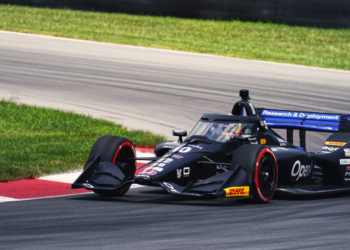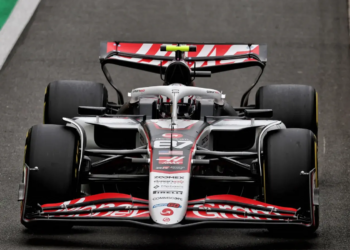Renault Team Principal Cyril Abiteboul has warned that Formula 1 must tackle the “serious topic” of so-called B-teams in the championship.
The Haas F1 Team uses the regulations to out-source as much of its parts as possible – holding a close relationship with Ferrari – while Alfa Romeo has also forged a close alignment with the Italian operation.
Red Bull and Toro Rosso this season have a much closer connection courtesy of both teams – under the ownership of the energy drink brand – using Honda power units.
That has prompted some independent teams to question the status of a Constructor, with Abiteboul suggesting the current model has inadequacies that could backfire in the future.
“It’s already a challenge for a team like us to compete against the top three teams who have 30 to 40 per cent more resources than us,” said Abiteboul.
“But if they are now capable of combining their resources with other teams, or getting the benefit of synergies within the scope of a budget cap, that’s a problem. That’s a problem for us. That’s a problem for at-least two other teams in the field.
“And I don’t want to talk for them – but that could also be a problem for a new entrant, willing to enter Formula 1 and willing to be competitive.
“So, that’s a serious topic because it’s maybe that we are now saying “OK, we have three top teams and that will be it. And anyone joining with have to accept they will not be in a positive to be competitive.
“I’m not here to complain or moan: we know the regulation but obviously we are extremely careful about what’s going to happen in 2021.
“For now, we are not convinced about the safeguards or the containment measures that have been put forward, despite the fact that you can trade some parts in the context of a budget cap – but we will continue to work with governing bodies to hopefully get to a more satisfying outcome.”
Red Bull boss Christian Horner and Ferrari chief Mattia Binotto countered Abiteboul’s perspective, pointing to the emergence of Haas and cost-saving ability for Toro Rosso.
“There wouldn’t be a Haas if that model wasn’t available,” said Horner. “I think the affordability of Formula 1 is extremely expensive. So, Toro Rosso, they’re using an awful lot of components from RB14. So, it’s effective for them within the non-listed parts they’re permitted to do. They don’t have to have the design resource, the R&D infrastructure – so therefore the cost for them to go racing is affected by that.
“I think that there’s ultimately a sensible offset between needing to be a full-blown Constructor team and being able to acquire those non-listed parts. So, personally, we don’t have an issue with it, and feel that, for the smaller teams, it’s been demonstrated that it’s cost-effective and works.”
“The Haas model has shown how good it is for such a team, and I think at the end it’s a good thing for F1,” added Binotto.
“As we’re looking ahead, I think if there are any concerns, it’s up to us to understand what are the concerns and make sure that we are mitigating, or avoiding them – but I think that the model in itself is the right model.”






